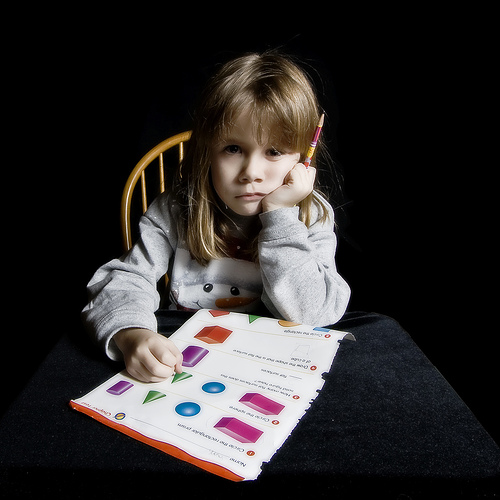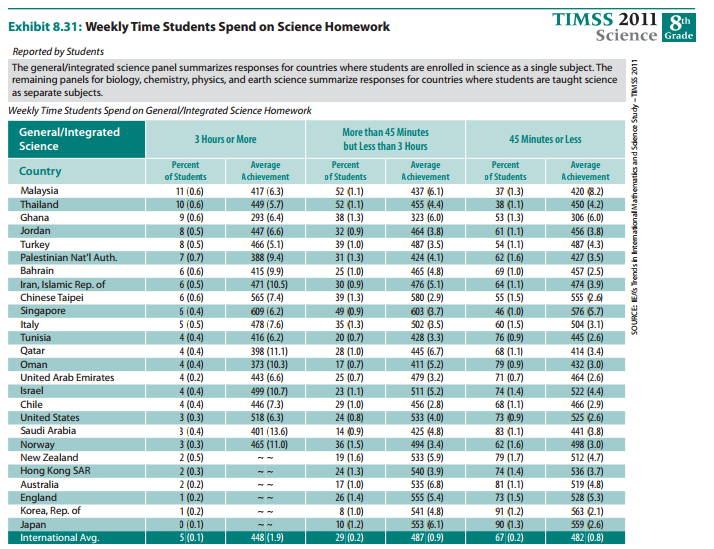
If they actually took time off to read even the one report for science–albeit the 520+ page long report. They’d find some rather interesting data.
Take for instance the controversial topic of Homework. There’s a huge Malaysian inclination to load our children with homework, with the noble aim to familiarize themselves with the subject matter and hence improve their test scores.In fact, in all countries surveyed by the TIMSS study, Malaysian students are given the most homework. The MOST!!
Yet we score in the bottom third of the study. Too much homework is bad, but just how much is too much?
The actual data from the TIMSS study, suggest that the optimal amount of science homework to give a child should be no more than 45 minutes per week per subject. You heard that right–in fact, across all the countries in the study, anything more than this and the test scores start to DECREASE.

Too much homework is bad
63% of Malaysian students spend more than 45 minutes on Science Homework per week, with a good 11% spending more than 3 hours. That’s a lot of hours per week to be spending on just one subject.
The average test scores for those spending more than 3 hours a week on science homework was just 417. That’s lower than the average of 437 posted by those in the 45 minutes to 3 hour category. More interestingly, even students who spent less than 45 minutes on Science homework per week scored HIGHER than those who spent more than 3 hours per week.
The results speak for themselves, children who spent more than 3 hours a week on Science Homework did the worst among all, and the results are consistent across all the countries–not just Malaysia. This is conclusive proof, that 45 minutes of homework per week for Science is more than good enough for your child to excel, anything more than 45 minutes and they start to perform worse–not better. So be careful how much tuition and homework you assign your children on a weekly basis.
In fact, contrary to popular belief, Japanese and Korean students weren’t the studious book nerds we thought they were. Almost all (90%) students from these countries reported doing less than 45 minutes of home work per week for science. In the US only 73% of students reported doing less than 45 minutes of science homework per week–and even in the US, the students who did less than 45 minutes of homework scored higher than those doing more than 3 hours. There were too few students from either Japan or Korea who reported doing more than 3 hours of homework to provide any meaningful statistical comparison.
So if you believe that the Koreans and Japanese pressure their kids to do homework–that’s nothing compared to what Malaysian parents and teachers do.
The only ‘odd-ball’ in the equation was Singapore. It was the only country on the list where more homework actually equaled to better performing students. I find this particularly interesting, but it must be said than even with more than 3 hours of science homework per week, the students only did marginally better than those who did far less homework.
Malaysians and Homework
Just last week, I had a friend lament to me that Australian Kindergarten children are given no homework–and she seemed surprised by the fact. From my own experience, I was once ‘reprimanded’ by a relative for expounding the virtues of the Montessori education because apparently a fully-fledged Montessori education for Malaysian children will not ‘prepare’ them enough for Standard 1. Of course I was shocked–do we need to ‘prepare’ students for standard 1?
I was fascinated by Montessori ever since I learnt that both Google founders were Montessori ‘graduates’ and attribute their creative mindset to their early education program, but apparently Malaysian parents are more interested in preparing their children for the rigours of primary school rather than letting them be children and explore. Exploration is an important element of science and perhaps too much homework limits the imagination of our children to pursue the sciences.
I also take pity on my niece who is loaded with homework even on school holidays — while she’s just standard 1. There is a deeply held–yet largely unscientific belief that homework is like ice-cream — the more the better. The actual raw data from TIMSS suggest that there a limit to the positive effects of homework at a rather low point of just 45 minutes per week, it starts diminishing test scores rather than improving them. (also the ice cream pun explains my expanding stomach area)
Less Homework in Malaysia will equal to better results
10% of Malaysian 14-year olds spend more than 3 hours a week doing Science Homework–yet this same 10% score exhibit only a basic understanding of Science. As to why this is the case is up for discussion, but what it points us to is that there is just way too much homework being assigned to school children, with negative results.
It’s also devastating to note that hardest working students are also the lowest performers, signifying perhaps rather unimaginative teachers assigning bucket loads of homework to students with good intentions–but ultimately doing more harm than good.
It’s also equally sobering to see that even the with optimal amount of homework assigned–Malaysian students never even reach an Intermediate understanding of science (characterized by a score of 475 or higher in the TIMSS paper). So we know there is more to do, but I would suggest at least we start by clamping down on homework first.